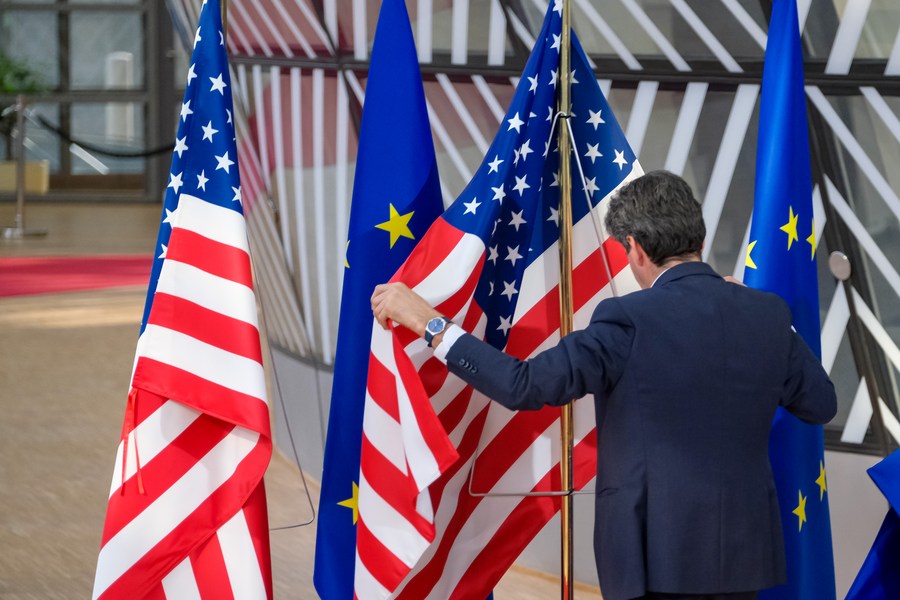
A staff member hangs a US national flag before US President Joe Biden arrives for the European Council meeting in Brussels, Belgium, March 24, 2022. (Photo: Xinhua)
Prior to and during both French President Emmanuel Macron's state visit to the United States and the third US-EU Trade and Technology Council Ministerial Meeting, there have been plenty of signs of European discontent with the US' disregard of its allies' interests.
The dissatisfaction ranges from the military conflict in Ukraine to the US Inflation Reduction Act of 2022, and it prompted the French leader to appeal for "re-synchronizing" the US-European relationship.
But just as their fierce partisan competition has in no way prevented the Democratic and Republican parties in the US from demonstrating a striking unanimity when it comes to confronting China in congressional legislation, the apparent current crack in the transatlantic alliance has hardly affected the two sides' consensus on the perceived need to confront China.
The fourth high-level meeting of the US-EU Dialogue on China and the third meeting of the US-EU High-Level Consultations on the Indo-Pacific, which were held slightly earlier than the trade event, revealed a clear outline of a future US-EU approach to relations with China that is worth serious concern on Beijing's part. Together they sent the worrying message that, in spite of all the differences across the Atlantic, the US and EU have developed similar, if not identical, outlooks on China and China policies, which may further complicate endeavors to rectify recently frayed ties.
Considering the concept of the "Indo-Pacific" itself and subsequent "Indo-Pacific strategies" have both been created as a part of the US-led West's initiative to deal with a China they have increasingly identified as an emerging "threat", both events were to a great extent about China.
Although Macron's call for "re-synchronizing" came three days afterward, it is appropriate to consider the convergence of their China policy as the first successful step in that direction.
Throughout their communication over China, the "Indo-Pacific", and other global topics, US Deputy State Secretary Wendy Sherman and European External Action Service Secretary General Stefano Sannino, who co-chaired the meetings, made sufficiently clear there is a shared interest in what US and European decision-makers take as moves to shape China's strategic environment.
A daunting task facing Beijing, therefore, is not only to push back against the unfair allegations that mislead Western perceptions and decision-making, but, more importantly, to work hard to dismantle the erroneous cognitive foundations for the antagonistic China policies of the Western countries.
The multiple challenges the world faces are caused and intensified by wrong judgments to some extent, such as the proposition that China will be the root cause of all tomorrow's troubles. Both the EU and the US should realize that colluding to impede China's development will not solve the problems, but only make them worse.
The recent meeting between the heads of state of China and the US was said to be "candid, in-depth, constructive". It should serve as a springboard for greater communication that clearly and directly clarifies interests, intentions and policies.
And if there is, as both the US and EU claim, no desire for confrontation, they should work with Beijing to manage tensions and differences, and advance exchanges and cooperation.


